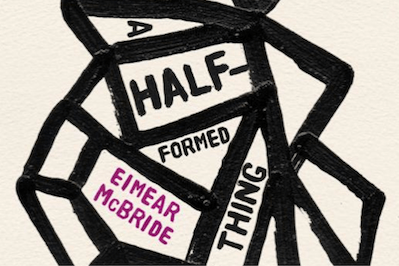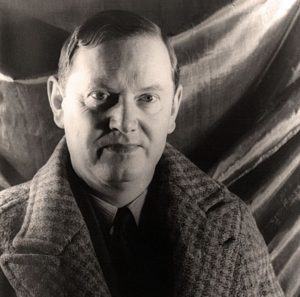A Girl Is a Half-Formed Thing
You either let this innovative novel, written in an impressionistic style reflecting a fragmented and damaged psyche, teach you how to read it, or you suffer through what could feel like a migraine in print. Photo by Coffee House Press
Photo by Coffee House Press
Photo by Coffee House Press
|
To see long excerpts from “A Girl Is a Half-Formed Thing” at Google Books, click here. |
“A Girl Is a Half-Formed Thing” A book by Eimear McBride
Americans finally have a chance to see what all the fuss is about over Eimear McBride’s “A Girl Is a Half-Formed Thing.”
Its success has the makings of a minor literary legend. The Irish writer’s debut novel languished for nine years without a publisher until it was finally released last year by a tiny new press in Norwich, England: Gallery Beggar, “a company specifically set up to act as a sponsor to writers who have struggled to either find or retain a publisher.”
Soaring from that humble beginning, “A Girl Is a Half-Formed Thing” went on to win the Kerry Group Irish Novel of the Year Award, the Goldsmiths Prize, the Desmond Elliott Prize and the Baileys Women’s Prize — about $100,000 in prize money.
Hearing of those accolades abroad, you might assume that the novel sparked a bidding war among big New York publishers.
You would be wrong.
If a book like Donna Tartt’s “The Goldfinch” represents the seamless confluence of critical and popular tastes, McBride’s book represents their complete disconnect.
“A Girl Is a Half-Formed Thing” is an extraordinarily demanding novel that will fascinate dozens of American readers. The narrator is a young woman beset by unending emotional betrayals and physical abuse. Her father abandons the family in the opening pages. Her mother is a fanatical Roman Catholic who vacillates between begging the Virgin Mary for blessings and shrieking at her daughter for being a slut. Her brother has brain cancer. A relative starts sexually abusing her when she’s 13. Later, strangers rape and beat her. And only more incest and anonymous sex can blot out the pain of her life.
I’m not cherry-picking the low points here; this is the novel’s unrelenting content. It’s a staggering emotional ordeal that draws us into the world of a woman forced to endure a knife drawer of horrors that would slice up anyone’s sanity.
Which brings us to the unusual language of “A Girl Is a Half-Formed Thing.” McBride writes in a stream-of-consciousness style that reflects her narrator’s fragmented and damaged psyche. It’s a method as clever and effective as it is opaque and confusing. Here she is when she finally gets away from mother-harpy and moves into her own place:
“City all that black in my lungs. In my nose. Like I am smoking am not but still. I’ll have a creaky bed up in some woman’s house. For too much a week, that I don’t guess. Will do. Maybe soon. Unpack my socks and. Oh. That’s being lonely. Lying here. Head and feet not knowing where they’ve come to. The rest and. Both of ye. And shocking. That.”
Dialogue comes to us mashed up like this:
“In the morning. Stung my eyes. Awake now? Are you alright? I’m a. And what have you to tell? What? God you look desperate are you she says laying on my bed. Wag fag at me. What have you been up to? He? Who? Just I. I. Jesus Christ you know what. My grandfather died. Well that isn’t the look of you you have. He? Who? Yes. Who? What? I just need a spot of sleep. Well there’s a cup of tea there. Thanks. And I’m staying the week. Oh right.”
In some sections, the novel’s halting, elliptical style conveys confusion and terror more honestly than coherent paragraphs ever could. McBride has perfected a language commensurate with the scrambled strains of shame, pain and desire felt by a girl being raped by her uncle. Her garbled sentences capture the lacunae of intoxication. Her phrases, constantly glancing, retreating and returning, enact the experience of hearing and ignoring, staring at and looking away from the person you love most dying.Even amid this jangle of words and phrases, there are moments that come into horrifying focus. I’ll never forget the scene in which her brother listens carefully to the hospice doctor and then asks, “When am I going to get well?”
You either let this strange novel teach you how to read it and grow accustomed to its impressionistic voice, or you suffer through what feels like a migraine in print. But I’m not convinced that pride of endurance is sufficient reward for completing “A Girl Is a Half-Formed Thing.” Critics are wont to call McBride’s style Joycean, but skeptical I that. Judging. What is is. Who?
It’s fair to note that not all big novels with lots of eccentric characters are necessarily Dickensian, and not all novels written in garbled syntax are necessarily Joycean. In 1987, the Irish poet Christopher Nolan, who died in 2009, published a gorgeous autobiography called “Under the Eye of the Clock,” and the remarkable lyricism of that book reflected his unusual relationship to language as a person with cerebral palsy who could not speak. But there was nothing crippled about his ingenious sentences, nothing handicapped about his inventive style. Even Caliban, that half-formed creature in Shakespeare’s “The Tempest” who “wouldst gabble like / A thing most brutish,” is given speeches of eloquent rage and despair. But McBride is so quick to fracture her phrasing that she rarely sustains such moments. I appreciate the stylistic theory behind her tortured style, but I also couldn’t help but wish that these linguistic shenanigans would get out of the way once in a while and let this plaintive story come through unimpeded.
More sophisticated readers will claim that I’m standing in front of a Jackson Pollock and asking for more patches of Rembrandt, to which I can answer only by quoting this passage toward the end: “Stick it ionthe don’tinside wwherhtewaterisswimming htroughmynoseandmouth throughmysense myorgands sthroughmythrough. That. A. My brain. He. Like. Now. Ithink i smell of woodwherethe river hits the lakebrownwashfoamy up the bank side Isee allcreaturesthere fish ducklings inthespring spring water going throughmyveins sinktheocean seeoutfar my salt my. Sea firsttime. Ahhhh pisses.”
Easy for her to say.
Ron Charles is the editor of The Washington Post Book World.
©2014, Washington Post Book World Service/Washington Post Writers Group
Your support matters…Independent journalism is under threat and overshadowed by heavily funded mainstream media.
You can help level the playing field. Become a member.
Your tax-deductible contribution keeps us digging beneath the headlines to give you thought-provoking, investigative reporting and analysis that unearths what's really happening- without compromise.
Give today to support our courageous, independent journalists.






You need to be a supporter to comment.
There are currently no responses to this article.
Be the first to respond.